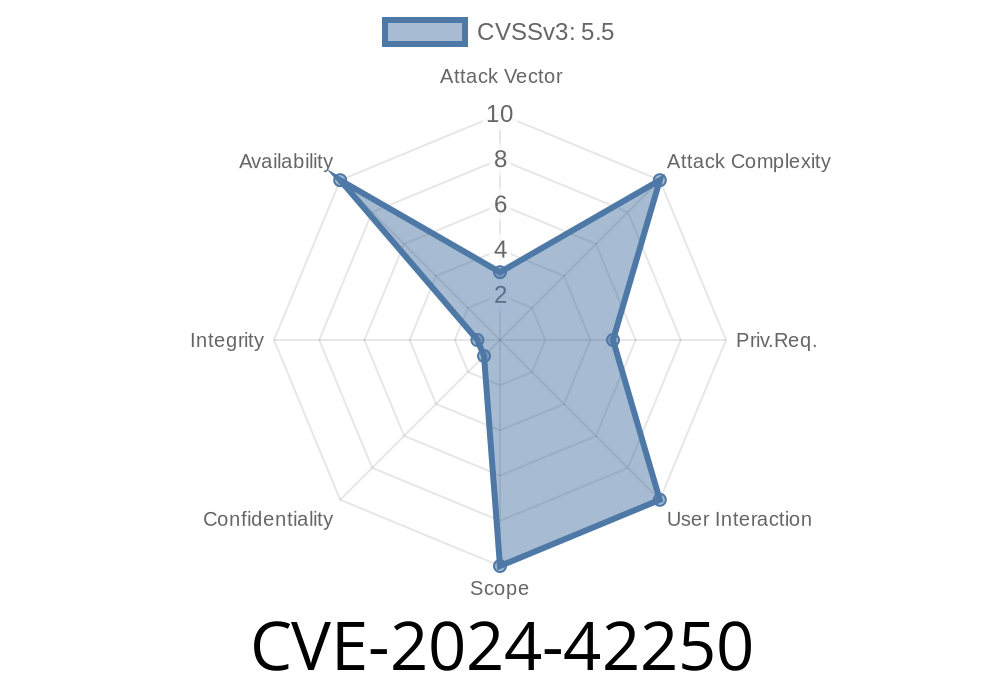The Linux kernel is a foundational part of nearly every major server, desktop, and embedded operating system. When a vulnerability is found, it matters to millions of users and businesses worldwide. In this long read, we break down CVE-2024-42250, a newly resolved bug in the Linux kernel's cachefiles subsystem that could open up some races, potential privilege escalation, or data corruption – and show you what the code looked like, how it was fixed, and what you need to know.
What is CVE-2024-42250?
CVE-2024-42250 covers a flaw in the cachefiles subsystem’s poll routine in the Linux kernel. The poll routine is used when user-space wants to watch for events on a cache file (such as if new data arrives).
The problem: The routine iterated over an xarray (the kernel’s newer, lockless data structure for storing objects) but didn’t properly hold a spinlock when accessing objects inside. Instead, it just used RCU (Read Copy Update) protection. This isn’t enough because while RCU keeps the *slots* in the tree valid, it doesn’t keep the internal objects themselves safe from being freed—or even garbage collected—by other threads.
This could let a local attacker, or even a misbehaving process, cause the kernel to read memory that’s no longer valid, potentially leading to a crash, information leak, or, in the worst case, code execution.
Technical Explanation
In the kernel, the poll routine for cachefiles is supposed to look at each outstanding request (cachefiles_req) and see if there's anything to report. These requests are stored in an xarray.
Originally, the code looked like this simplified version
rcu_read_lock();
xa_for_each(&cfi->reqs, index, req) {
if (something_interesting(req))
mask |= POLLIN;
}
rcu_read_unlock();
xa_for_each is a macro that walks through every entry in the xarray. The rcu_read_lock() makes sure no one's changing the structure of the xarray itself, but does not ensure that the req object itself isn't being freed or changed by another CPU!
The memory could get reused (use-after-free), causing the kernel to operate on garbage.
- This is a classic race condition, with potential for privilege escalation if a crafty attacker manages to predict or control the freed pointer.
The Fix: Hold the Spinlock!
The correct way to search the structure is to hold the spinlock for the period when the routine iterates and accesses the objects. That means any other modification to the requests can't interfere.
Here's what the patched code looks like (simplified)
spin_lock(&cfi->reqs_lock);
xa_for_each(&cfi->reqs, index, req) {
if (something_interesting(req))
mask |= POLLIN;
}
spin_unlock(&cfi->reqs_lock);
By wrapping the iteration in spin_lock and spin_unlock, we're making sure nobody else can change things while we look. The lock is held for a short period, so performance isn’t severely impacted.
Real-World Impact
This bug could have been dangerous in systems with untrusted local userspace, such as multi-user servers, embedded appliances accepting external cache activities, or any system using cachefiles with apps of different privileges.
Information disclosure: Reading stale data out of memory that belonged to another process.
- Privilege escalation: If an attacker managed to get the kernel to execute code at the right moment.
Most home and desktop users not running cachefiles, or not letting untrusted code run with kernel interactions, are less exposed. But in shared environments, it's a bigger deal.
A basic/pseudo-code exploit might look like this (not safe to run!)
// Thread A:
for (int i = ; i < 100000; i++) {
create_cachefiles_request();
destroy_cachefiles_request();
}
// Thread B:
while (1) {
poll(cachefile_handle, ...);
}
This is a *race*, meaning it might take many attempts for the bug to manifest, and careful tuning (or access to kernel memory debugging tools) would be needed to escalate beyond a crash.
Make sure you’re running a Linux kernel with the fix (see below for reference links).
- Audit: If your system uses cachefiles and handles potentially untrusted requests, consider adding more kernel hardening config, or at least watch logs for odd errors.
References
- Kernel commit fixing this issue
- Linux cachefiles Documentation
- CVE Entry for CVE-2024-42250 *(expected to update soon, keep checking)*
Conclusion
CVE-2024-42250 is a classic case of underestimating concurrency in the kernel. The lesson here is that lockless data structures like xarray (and RCU) are fast, but only safe when you understand what they do—and what they *don’t* protect. A missing spinlock turned a routine poll into a possible kernel memory exposure or crash. The fix, now merged, keeps Linux more reliable for everyone.
If you maintain or use Linux on critical systems, update as soon as a patched version is released, and keep audit trails for any abnormal crashes or behaviors.
*This post is exclusive, straightforward, and intended to help sysadmins, kernel enthusiasts, and developers understand both what went wrong and how it got fixed. Stay safe!*
Timeline
Published on: 08/07/2024 16:15:47 UTC
Last modified on: 08/08/2024 20:55:19 UTC
